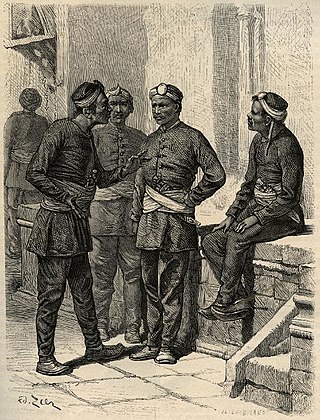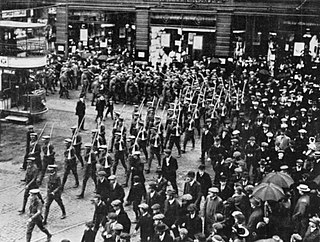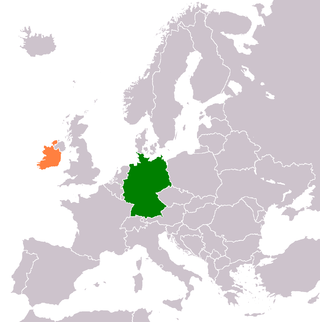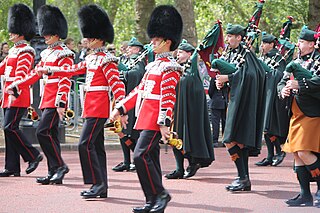
The British Army is the principal land warfare force of the United Kingdom, a part of the British Armed Forces along with the Royal Navy and the Royal Air Force. As of 1 January 2024, the British Army comprises 75,166 regular full-time personnel, 4,062 Gurkhas, 26,244 volunteer reserve personnel and 4,557 "other personnel", for a total of 110,029.

The Troubles were an ethno-nationalist conflict in Northern Ireland that lasted for about 30 years from the late 1960s to 1998. Also known internationally as the Northern Ireland conflict, it is sometimes described as an "irregular war" or "low-level war". The conflict began in the late 1960s and is usually deemed to have ended with the Good Friday Agreement of 1998. Although the Troubles mostly took place in Northern Ireland, at times violence spilled over into parts of the Republic of Ireland, England, and mainland Europe.

Remembrance Day is a memorial day observed in Commonwealth member states since the end of the First World War to honour armed forces members who have died in the line of duty. The day is also marked by war remembrances in several other non-Commonwealth countries. In most countries, Remembrance Day is observed on 11 November to recall the end of First World War hostilities. Hostilities ended "at the 11th hour of the 11th day of the 11th month" of 1918, in accordance with the armistice signed by representatives of Germany and the Entente between 5:12 and 5:20 that morning. The First World War formally ended with the signing of the Treaty of Versailles on 28 June 1919.

The Gurkhas or Gorkhas, with the endonym Gorkhali, are soldiers native to the Indian subcontinent, chiefly residing within Nepal and some parts of North India.

Loyalism, in the United Kingdom, its overseas territories and its former colonies, refers to the allegiance to the British crown or the United Kingdom. In North America, the most common usage of the term refers to loyalty to the British Crown, notably with the loyalists opponents of the American Revolution, and United Empire Loyalists who moved to other colonies in British North America after the revolution.

The aftermath of World War I saw far-reaching and wide-ranging cultural, economic, and social change across Europe, Asia, Africa, and even in areas outside those that were directly involved. Four empires collapsed due to the war, old countries were abolished, new ones were formed, boundaries were redrawn, international organizations were established, and many new and old ideologies took a firm hold in people's minds. World War I also had the effect of bringing political transformation to most of the principal parties involved in the conflict, transforming them into electoral democracies by bringing near-universal suffrage for the first time in history, as in Germany, Great Britain, and Turkey.

Wars of national liberation, also called wars of independence or wars of liberation, are conflicts fought by nations to gain independence. The term is used in conjunction with wars against foreign powers to establish separate sovereign states for the rebelling nationality. From a different point of view, such wars are called insurgencies, rebellions. Guerrilla warfare or asymmetric warfare is often utilized by groups labeled as national liberation movements, often with support from other states.

The Ulster Volunteers was an Irish unionist, loyalist paramilitary organisation founded in 1912 to block domestic self-government for Ireland, which was then part of the United Kingdom. The Ulster Volunteers were based in the northern province of Ulster. Many Ulster Protestants and Irish unionists feared being governed by a nationalist Catholic-majority parliament in Dublin and losing their links with Great Britain. In 1913, the militias were organised into the Ulster Volunteer Force (UVF) and vowed to resist any attempts by the British Government to impose Home Rule on Ulster. Later that year, Irish nationalists formed a rival militia, the Irish Volunteers, to safeguard Home Rule. In April 1914, the UVF smuggled 25,000 rifles into Ulster from Imperial Germany. The Home Rule Crisis was interrupted by the First World War. Much of the UVF enlisted with the British Army's 36th (Ulster) Division and went to fight on the Western Front.

The Grand Orange Lodge of Scotland, or Loyal Orange Institution of Scotland, Orange Order in Scotland, The Orange Order is the oldest and biggest Protestant fraternity in Scotland. The Loyal Orange Institution was an official participant in the 2014 independence referendum. Its headquarters are in Motherwell, having previously been in Bridgeton, Glasgow with 15,000 members in the Scottish Lowlands.

Since at least 1542, England and later Great Britain and Ireland have been connected politically, reaching a height in 1801 with the creation of the United Kingdom of Great Britain and Ireland. About five-sixths of the island of Ireland seceded from the United Kingdom in 1922 as the Irish Free State. Historically, relations between the two states have been influenced heavily by issues arising from their shared history, the independence of the Irish Free State and the governance of Northern Ireland. These include the partition of Ireland and the terms of Ireland's secession, its constitutional relationship with and obligations to the UK after independence, and the outbreak of political violence in Northern Ireland. Additionally, the high level of trade between the two states, their proximate geographic location, their common status as islands in the European Union until Britain's departure, common language and close cultural and personal links mean political developments in both states often closely follow each other.
The military history of Europe refers to the history of warfare on the European continent. From the beginning of the modern era to the second half of the 20th century, European militaries possessed a significant technological advantage, allowing its states to pursue policies of expansionism and colonization until the Cold War period. European militaries in between the fifteenth century and the modern period were able to conquer or subjugate almost every other nation in the world. Since the end of the Cold War, the European security environment has been characterized by structural dominance of the United States through its NATO commitments to the defense of Europe, as European states have sought to reap the 'peace dividend' occasioned by the end of the Cold War and reduce defense expenditures. European militaries now mostly undertake power projection missions outside the European continent. Recent military conflicts involving European nations include the 2001 War in Afghanistan, the 2003 War in Iraq, the 2011 NATO Campaign in Libya, and various other engagements in the Balkan and on the African continent. After 2014, the Russian annexation of Crimea and the ongoing Russo-Ukrainian War prompted renewed scholarly interest into European military affairs. For further the context see History of Europe.
The military history of Africa is one of the oldest military histories in the world. Africa is a continent of many regions with diverse populations speaking hundreds of different languages and practicing an array of cultures and religions. These differences have also been the source of much conflict since a millennia.

The France–Ireland relations refers to the diplomatic relations between the French Republic and Ireland. France and Ireland are both members of the Council of Europe, European Union and the Organisation for Economic Co-operation and Development. Ireland is an associate member of La Francaphonie.

Germany and Ireland are members of the European Union. Relations between the two countries have described, in 2011 by Ruairí Quinn, then Irish Minister for Education: "Ireland and Germany have enjoyed an excellent long-standing political and economic relationship, and culture, mutual trust and common values have always been at the core of our relations", going to on add further that "When the first hydro-electric Shannon scheme was established, it was a very deliberate decision, a very cultural assertion of separation from London, to invite Siemens to provide technical assistance."

Ireland–Spain relations are the current and historical relations between Ireland and the Kingdom of Spain. Both states are members of the Council of Europe, the European Union, the Eurozone and the Organisation for Economic Co-operation and Development.
The history of guerrilla warfare stretches back to ancient history. While guerrilla tactics can be viewed as a natural continuation of prehistoric warfare, the Chinese general and strategist Sun Tzu, in his The Art of War, was the earliest to propose the use of guerrilla warfare. This directly inspired the development of modern guerrilla warfare. Communist leaders like Mao Zedong and North Vietnamese Ho Chi Minh both implemented guerrilla warfare in the style of Sun Tzu, which served as a model for similar strategies elsewhere, such as the Cuban "foco" theory and the anti-Soviet Mujahadeen in Afghanistan. While the tactics of modern guerrilla warfare originate in the 20th century, irregular warfare, using elements later characteristic of modern guerrilla warfare, has existed throughout the battles of many ancient civilizations.

Irish in the British Armed Forces refers to the history of Irish people serving in the British Armed Forces. Ireland was then as part of the United Kingdom from 1800 to 1922 and during this time in particular many Irishmen fought in the British Army. Different social classes joined the military for various reasons, including the Anglo-Irish officers who thoroughly wished to support the "mother country", while others, typically poorer Irish Catholics, did so to support their families or seeking adventure.
The following outline is provided as an overview of and topical guide to the history of the British Isles:













